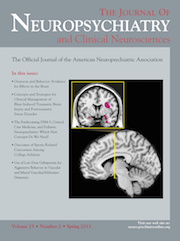Desvenlafaxine-Induced Worsening of Hypertension
To the Editor: Desvenlafaxine, a serotonin–norepinephrine reuptake inhibitor (SNRI), is the major active metabolite of venlafaxine. It has greater antidepressant effect than venlafaxine, owing to its greater effect on norepinephrine reuptake relative to its effect on serotonin reuptake.1 It also effectively reduces anxiety symptoms, as shown by data pooled from nine randomized, placebo-controlled, double-blind studies.2 Desvenlafaxine appears to be well tolerated, and the most common adverse events leading to discontinuation were nausea (4%), dizziness (2%), headache (2%), and vomiting (2%). Whereas dose-dependent increase in hypertension has been reported to occur with venlafaxine,3,4 on PubMed search, there are no reported cases of desvenlafaxine-induced hypertension. We report worsening of hypertension with desvenlafaxine in a patient with adequate control of blood pressure with antihypertensives.
Case Study
“Mrs. A,” a 62-year-old lady diagnosed with generalized anxiety disorder 2½ years ago, presented with prominent anxiety and secondary depressive symptoms. She had received various medications, such as serotonin reuptake inhibitors, mirtazapine, levosulpiride, and tianeptine, without much benefit. She had a 15-year history of hypertension and was being treated with a combination of losartan potassium 50 mg and hydrochlorthiazide 12.5 mg per day, with good control of blood pressure (BP). On physical examination, there was no abnormal finding, and her baseline BP was within normal range (122/82 mmHg, supine, right brachial). Investigations including hemogram, hepatic, and renal functions were normal. In view of the poor response to previous medications, desvanlafaxine was initiated at 50 mg/day. After 2 weeks, her BP increased to 200/120 mmHg (supine, right brachial). Considering desvenlafaxine-induced worsening of hypertension, it was discontinued, and she was started on a combination of escitalopram up to 20 mg/day, buspirone 30 mg/day, along with clonazepam 0.5 mg at bedtime. Within 2 weeks, her BP came down to normal range (122/80 mmHg, supine, right brachial). On the Naranjo Adverse Drug Reaction probability scale,5 her score was 8, suggestive of probable association of desvenlafaxine with increased blood pressure. Cognitive-behavioral therapy was started along with pharmacological treatment, with which there was partial control of anxiety symptoms that were maintained at follow-up.
Discussion
In our case, there was sustained BP elevation after addition of desvenlafaxine in an elderly patient with hypertension that was previously controlled with antihypertensive medications. The association appeared probable, as the BP returned to normal range after withdrawal of desvenlafaxine. There have been no reported cases of desvenlafaxine-associated hypertension in previous studies.6 Nevertheless, the summary of product characteristics for desvenlafaxine7 mentions sustained elevations in BP, similar to that of venlafaxine. The incidence of sustained hypertension was 1.3% at a dose of 50 mg of desvenlafaxine, 0.7% at 100 mg, 1.1% at 200 mg, and 2.3% at 400 mg, as compared with 0.5% for placebo.7
Venlafaxine is associated with BP elevations at higher doses,4 although, occasionally, smaller doses also resulted in recurrence of hypertension, specifically in Asian patients.8 Rarely, hypertensive crisis has been reported with venlafaxine.9 The risk of hypertension is higher in elderly subjects; in one study, 24% (95% CI: 7.3%–40.7%) of initially normotensive participants and 54% (95% CI: 34.3%–74%) of those with preexisting hypertension experienced an increase in BP.10 Such a dose–response relationship has not been reported with desvenlafaxine. In our case, 50 mg/day of desvenlafaxine produced sustained elevation in BP, while the patient was on a combination of losartan potassium 50 mg and hydrochlorthiazide 12.5 mg per day.
Desvenlafaxine is a bicyclic phenylethylamine compound, which has greater affinity for serotonin and norepinephrine transporters, and virtually no affinity for muscarinic, histaminergic, and adrenergic receptors.11 BP elevation with venlafaxine at high doses may be explained through inhibition of reuptake of noradrenaline, in addition to that of serotonin. In contrast, desvenlafaxine does not exhibit differential inhibition of reuptake of noradrenaline and serotonin at different doses; this may explain the lack of dose–response relationship in BP elevation.
Our report suggests that desvenlafaxine, similar to venlafaxine, may worsen preexisting hypertension. Therefore, it is prudent to monitor BP regularly in treatment with both desvenlafaxine and venlafaxine, even at lower doses. Specifically, it may be worthwhile to consider alternative treatment options in those with diagnosed hypertension even when BP is controlled with antihypertensive medications.
1 : Desvenlafaxine: a new serotonin–norepinephrine reuptake inhibitor for the treatment of adults with major depressive disorder. Clin Ther 2009; 31:1374–1404Crossref, Medline, Google Scholar
2 : Analysis of the effect of desvenlafaxine on anxiety symptoms associated with major depressive disorder: pooled data from 9 short-term, double-blind, placebo-controlled trials. CNS Spectr 2010; 15:187–193Crossref, Medline, Google Scholar
3 : Cardiovascular safety in depressed patients: focus on venlafaxine. J Clin Psychiatry 1995; 56:574–579Medline, Google Scholar
4 : Effects of venlafaxine on blood pressure: a meta-analysis of original data from 3,744 depressed patients. J Clin Psychiatry 1998; 59:502–508Crossref, Medline, Google Scholar
5 : A method for estimating the probability of adverse drug reactions. Clin Pharmacol Ther 1981; 30:239–245Crossref, Medline, Google Scholar
6 : Efficacy, safety, and tolerability of desvenlafaxine 50 mg/d for the treatment of major depressive disorder: a systematic review of clinical trials. Prim Care Companion J Clin Psychiatry 2010; 12: PCC.09r00845.Google Scholar
7 Pristiq [package insert]. Madison, NJ, Wyeth-Ayerst, September 2008Google Scholar
8 : Even low-dose treatment of venlafaxine may provoke recurrence of hypertension in an Asian patient? Gen Hosp Psychiatry 2001; 23:232–234Crossref, Medline, Google Scholar
9 : Hypertensive crisis associated with venlafaxine. Am J Med 2003; 115:676–677Crossref, Medline, Google Scholar
10 : Cardiovascular changes associated with venlafaxine in the treatment of late-life depression. Am J Geriatr Psychiatry 2006; 14:796–802Crossref, Medline, Google Scholar
11 : Desvenlafaxine succinate: a new serotonin and norepinephrine reuptake inhibitor. J Pharmacol Exp Ther 2006; 318:657–665Crossref, Medline, Google Scholar



